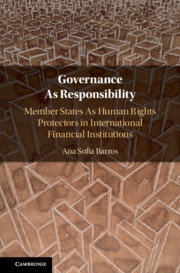 Governance As Responsibility
Governance As Responsibility Published online by Cambridge University Press: 28 June 2019
"Chapter II critically analyses the application of secondary rules of international law in the context of member State participation in international financial institutions. It begins by looking into the evolution of discussions on member State responsibility, culminating in the regime devised by the ILC in Part V of the ARIO. In this exercise, it sheds light on how -member States’ governance role was acknowledged all along. Based on identified insufficiencies in the ARIO in that respect, the Chapter subsequently examines whether member State governance may rather lead to member State responsibility for their own wrongful acts performed in an institutional setting. It thus concentrates on attribution rules. Inspired by contexts where member States act as implementers of institutional decisions and as troop contributors, the focus is placed on their participation in the representative organs of international financial institutions. Firstly, the international legal status of Executive Directors is explored, to demonstrate that, despite the duality inherent in their role, they can be considered State organs. Secondly, attention is brought to the dynamics of decision-making, which attest to the notion that voting emerges as a corollary of the power of sovereign representation, and should therefore be deemed conduct attributable to the State.
To save this book to your Kindle, first ensure [email protected] is added to your Approved Personal Document E-mail List under your Personal Document Settings on the Manage Your Content and Devices page of your Amazon account. Then enter the ‘name’ part of your Kindle email address below. Find out more about saving to your Kindle.
Note you can select to save to either the @free.kindle.com or @kindle.com variations. ‘@free.kindle.com’ emails are free but can only be saved to your device when it is connected to wi-fi. ‘@kindle.com’ emails can be delivered even when you are not connected to wi-fi, but note that service fees apply.
Find out more about the Kindle Personal Document Service.
To save content items to your account, please confirm that you agree to abide by our usage policies. If this is the first time you use this feature, you will be asked to authorise Cambridge Core to connect with your account. Find out more about saving content to Dropbox.
To save content items to your account, please confirm that you agree to abide by our usage policies. If this is the first time you use this feature, you will be asked to authorise Cambridge Core to connect with your account. Find out more about saving content to Google Drive.